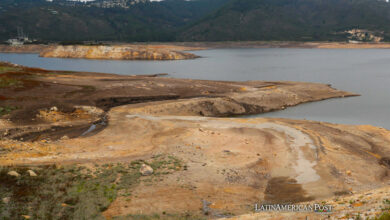These are the New Environmental Crimes in Colombia
The Law of Environmental Crimes in Colombia seeks to protect biodiversity by strengthening the sanctions that are already found in the Penal Code.

Photo: Reuters
”
LatinAmerican Post | Vanesa López Romero
Colombia is a country recognized worldwide for its biodiversity. Yet it is also a nation plagued by environmental and social injustice. Today it is the country where more social leaders and defenders of rights die each year, many of these are people who defend the environment on a daily basis, according to the Global Witness Report. In addition, the coffee country has a part of the Amazon rainforest, the region known as the lung of the world, which over the years has been plagued by legal and illegal activities that are endangering its very existence.
The Environmental Crimes Law was sanctioned in July 2021. It is a tool that today has new elements that have strengthened the five that already existed in the Colombian Penal Code. This is the commitment of the Ministry of Environment and Sustainable Development to protect the country’s biodiversity.
Illicit enrichment
When a person “appropriates, accesses, captures, maintains, introduces, extracts, exploits, exploits, exports, transports, trades, explores, traffics or in any other way benefits from the specimens, products or parts of the faunal resources, forest, floristic, hydrobiological, coral, biological or genetic of Colombian biodiversity” will be in breach of this law.
Which could lead to serving a sentence of 60 to 135 months. In addition, a fine of 43,750 current monthly minimum wages must be paid, which would currently be around 11,000,000 dollars.
In addition, in the event that this law is broken by cutting the fins of sharks, rays or chimeras to throw the rest of the body into the sea, the penalty will increase from one third to one half.
Also read: What economic consequences would there be if the Amazon becomes a savannah?
Wildlife trafficking
This not only applies to people who traffic specimens, but also to all the people involved in the chain of this practice: that is, to those who transport, market and acquire these living beings.
The penalty consists of 60 to 135 months in prison and a fine of 300 to 40,000 current monthly minimum wages, that is, around 10,160,000 dollars.
Like the aforementioned law, the penalty could be increased when the traffic “is committed through the export or commercialization of cartilaginous fish fins.”
Deforestation
Taking into account that the Colombian Amazon and the Chocó Darién are two of the 24 deforestation fronts globally, this law is one of the most anticipated and strongest.
The law consists of giving 60 to 144 months in prison to people who engage in this activity without the permission of the competent authorities or failing to comply with the rules and regulations for this practice. The fine is between 134 and 50,000 current monthly minimum wages (12,703,514 dollars).
In the event that the deforestation is carried out for land grabbing, illicit crops, the construction of illegal infrastructure or when it affects more than 30 contiguous hectares of extension and a period of up to six months is accumulated in the same deforested area, the penalty will be increased. to the half.
Damage to natural resources and ecocide
The penalty will be 60 to 135 months in prison and a fine of 167 to 18,650 current monthly minimum wages (4,762,169 dollars) for those who “destroy, disable, make disappear or cause a serious environmental impact or in any other way damages natural resources”.
Environmental Pollution
This law will punish whoever pollutes and causes damage to the environment directly or indirectly through emissions, discharges, radiation, etc. sources or bodies of water, subsoil, the atmosphere or airspace. Keep in mind that this would not only affect the environment and natural resources, but also the lives of human beings.
The penalty consists of 69 to 140 months in prison and a fine of 140 to 50,000 monthly minimum wages, that is, around 12,600,000 dollars.
Although these crimes are already in force in the Colombian Penal Code, there is still no guarantee at the social level for the environmental leaders who fight against these crimes on a daily basis.




